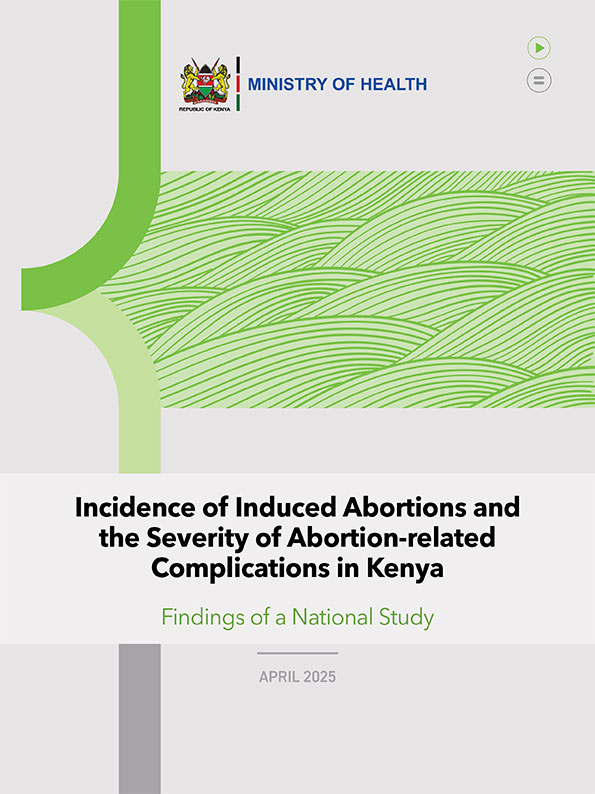A recently released national report details a study highlighting gaps in Kenya’s sexual and reproductive health services—and gives compelling evidence that expanding access to modern and effective family planning and contraception is crucial to preventing unintended pregnancies and unsafe abortion methods.
Ipas Africa Alliance was part of the Technical Advisory Group (TAG) that provided support for the study, “Incidence of Induced Abortions and the Severity of Abortion-related Complications in Kenya”. The joint study conducted by the Ministry of Health, the African Population and Health Research Center and Guttmacher Institute outlines the systemic changes needed to improve women’s reproductive health in Kenya.
“
At Ipas, we believe that meaningful policy change happens when technical evidence meets the lived experiences of those we serve. Our role in this process was to ensure both voices shaped the future of abortion care in Kenya.”
— Edward Ngoga, Quality of Care Manager, Ipas Africa Alliance
A uniquely positioned and trusted technical partner
Ipas was uniquely positioned as a technical partner of choice in the study, due to a strong track record of supporting Kenya’s public health sector to strengthen access to safe abortion and postabortion care. Through close collaboration with the Ministry of Health and county governments, Ipas has helped integrate abortion care into public health systems by supporting policy development, provider training, service delivery, and health system strengthening. Its trusted partnerships and technical expertise made it a credible and strategic choice for this study.
As a member of the technical working group, Ipas brought strong technical expertise in comprehensive abortion care, including self-managed abortion (SMA) and postabortion care (PAC). Ipas supported the mapping of both public and private sector facilities providing abortion-related services and facilitated the inclusion of clients to share their lived experiences. We also contributed to discussions on quality improvement, provider capacity building, and integration of abortion care into public health systems. By grounding policy discussions in both evidence and community voices, Ipas helped ensure that the group’s recommendations were technically robust and contextually relevant.
How the Technical Advisory Group shaped the study
As an integral member of the Technical Advisory Group, Ipas, alongside other partners, contributed in the following ways:
- Shaped strategic direction to ensure the research aligned with national priorities.
- Provided technical expertise on study design, methodology, and ethical considerations.
- Facilitated stakeholder engagement and validated research protocols.
- Oversaw progress and supported the dissemination of impactful findings.
Study highlights
1. Unintended Pregnancies and Induced Abortions
- Out of 2.85 million pregnancies, over 1.4 million (49%) were unintended.
- Approximately (79 in 100 births) 793,000 pregnancies ended in induced abortions, highlighting a significant reliance on abortion as a response to unintended pregnancies.
2. Unsafe Abortion-Related Complications
- More than 15% (16.4%) of women faced potentially life-threatening complications.
- 28.5% experienced moderate complications, while 1.4% suffered severe outcomes, including coma and death.
- Over 50% (53.7%) reported mild complications, underscoring the varied severity of abortion outcomes.
3. Unsafe Abortion Practices:
- Despite the prevalence of medication abortion (MA), a WHO-recommended method, 8% of women still resorted to unsafe abortion methods.
4. Contraceptive Use Gaps
- Only 1 in 3 women used contraception at the time of pregnancy.
- 4 in 10 women (42%) of women avoided contraception due to fear of side effects, indicating a critical barrier to effective family planning.
5. Weak Post-Abortion Care (PAC) Systems
- 2 in 10 (21%) of health facilities expected to provide PAC services failed to do so.
- Many facilities offering PAC struggled with stock-outs or limited contraceptive options, impairing their ability to deliver comprehensive care.
What next?
The study highlights the urgent need for systemic changes to improve women’s reproductive health in Kenya:
- Strengthen health facility readiness for comprehensive post-abortion care.
- Enhance access to and awareness of contraceptive options to prevent unintended pregnancies.
- Increase community education on safe abortion practices and PAC availability.
Ipas Africa Alliance remains committed to advancing reproductive health and rights through strategic partnerships and evidence-based advocacy.


